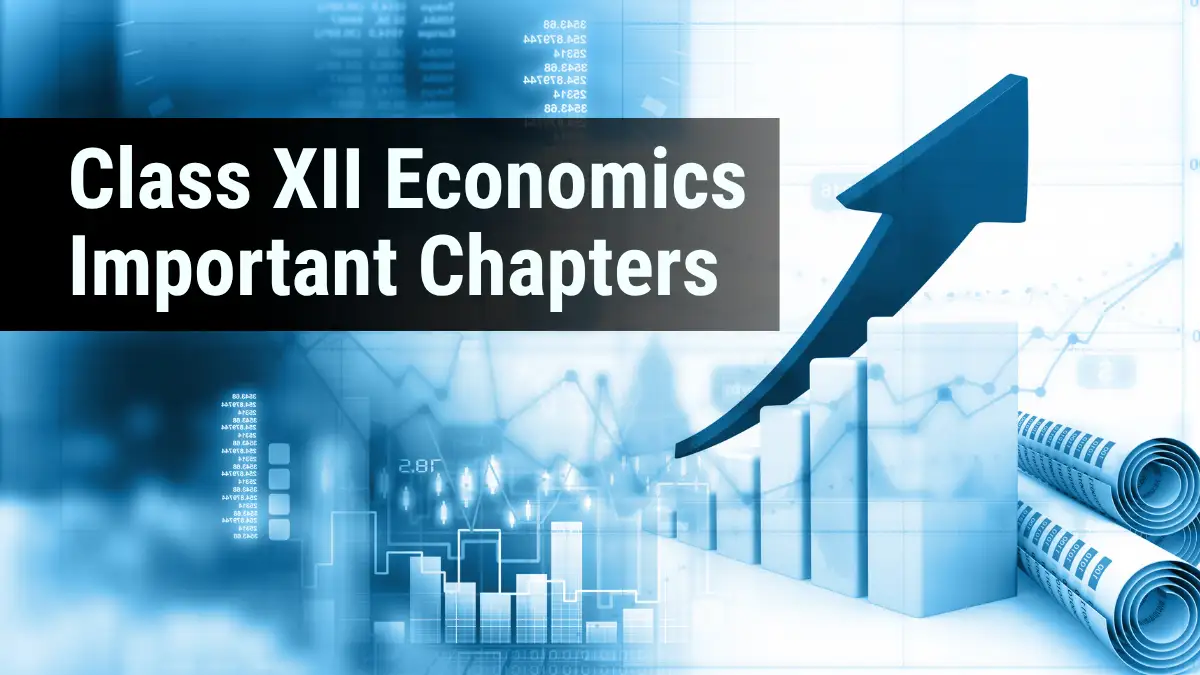When you start preparing for your exam, the first thing you look for is Class 12 Economics Important Chapters. You want to know what matters the most, which chapters carry high weightage, and how to focus your time. So this guide keeps everything very simple. No complex words. No confusing lines. Just clear, useful points that help you score better in Class 12 Economics.
Economics in Class 12 is divided into two main parts:
- Macro Economics
- Indian Economic Development (IED)
Both parts have important chapters, but some chapters always get more weightage in board papers. Let’s go chapter-wise and understand what to study and why it matters.
1. National Income and Related Aggregates
(Macro Economics)
This is one of the most important chapters in the whole Class 12 Economics syllabus. Most students find it easy, but only if they understand the basic ideas. You study simple things like GDP, GNP, NNP, personal income, national income, and methods of calculating national income.
Why this chapter is important:
- It always has numerical questions.
- It has direct theory questions.
- It forms the base for many other concepts in Macro.
In board exams, you can expect questions on:
- Difference between GDP and GNP
- Real and nominal GDP
- Methods of measuring national income
- Numericals based on income and expenditure methods
If you understand the formulas well, this chapter feels very scoring. Indeed, many toppers say they got full marks in these questions.
Also Read: Best Reference Books for Class 12th CBSE
2. Money and Banking
(Macro Economics)
This chapter feels very relevant because you see money in real life every day. Here you learn what money is, how banks work, and how the central bank controls the money supply.
Why this chapter matters:
- It teaches you the basics of RBI, credit creation, and banking functions.
- It always carries high weightage.
- Many case-study questions come from here.
Key topics include:
- Functions of money
- Commercial banks
- Credit creation
- RBI functions
- Tools of monetary policy
Moreover, if you prepare this chapter well, other macro chapters also feel easy.
3. Determination of Income and Employment
(Macro Economics)
This chapter may look difficult at first, but once you understand the flow, it becomes simple. You learn ideas like aggregate demand, aggregate supply, consumption, investment, and equilibrium.
Why this chapter is important:
- Many numerical questions come from this unit.
- It explains how an economy works in simple steps.
- Boards often ask graph-based questions.
Important areas:
- Aggregate supply and demand
- Propensity to consume
- Investment multiplier
- Saving and investment
- Income determination equilibrium
Furthermore, if you get the graphs right, this chapter becomes safe scoring territory.
4. Government Budget and the Economy
(Macro Economics)
This chapter explains where the government gets money from and where it spends it. You also learn basic ideas like deficit, budget types, taxes, and government spending.
Why this chapter is key:
- Very predictable questions
- Budget deficits are always asked
- High weightage chapter
Main topics include:
- Revenue and capital items
- Types of deficits
- Fiscal policy
- Budget structure
Indeed, many students say this chapter is the simplest to revise before exams.
Also Read: How to Get Full Marks in Maths Class 12
5. Balance of Payments (BOP)
(Macro Economics)
Many students confuse BOP with balance of trade, but once you read it with simple examples, it becomes very easy. This chapter talks about imports, exports, current account, capital account, and exchange rates.
Why it is important:
- Questions are mostly simple and direct
- Many case-study questions come from BOP
- It helps you understand how Indian economy connects with the world
You should know:
- Current account vs. capital account
- Types of exchange rates
- Foreign exchange meaning
- Causes of BOP deficit
Moreover, some numerical questions can also come from exchange rate concepts.
6. Development Experience
(Indian Economic Development)
This is one of the most important chapters in IED. You compare how these three countries have grown over time. Everything is simple — population, health, education, industries, and economic systems.
Why this chapter is important:
- Comparison questions are common
- Very easy to learn with tables
- Helps you score well in long answers
Expected questions:
- Compare India and China
- Compare India and Pakistan
- Human development indicators
- Features of economic systems
Indeed, this chapter becomes very easy if you read NCERT examples.
7. Economic Reforms Since 1991 (LPG)
(Indian Economic Development)
This chapter explains Liberalisation, Privatisation, and Globalisation — topics you hear often in real life. The ideas are simple but very important for exams.
Why this chapter matters:
- Always asked in boards
- Questions on LPG, WTO, and reforms are common
- Very easy to write in your own words
Key topics to study:
- LPG meaning
- Why 1991 reforms were needed
- Role of WTO
- Impact of globalisation
Furthermore, students find this chapter helpful for value-based and case-study questions.
8. Poverty
(Indian Economic Development)
This chapter explains what poverty is, how it is measured, and how the government tries to reduce it.
Important points include:
- Poverty line
- Causes of poverty
- Anti-poverty programmes
- Rural and urban poverty differences
Why this chapter is important:
- Very simple chapter
- Repeated questions on causes and measures
- Easy to score in long answers
Indeed, this is one of the easiest chapters in the book.
9. Human Capital Formation
(Indian Economic Development)
Human capital means people and their skills. You learn about education, health, training, and how they help the economy grow.
Important concepts:
- Role of education
- Role of health
- Human capital vs. human development
- Government’s role
Why this chapter is included in Class 12 Economics Important Chapters:
- Very predictable questions
- Easy to understand
- Most answers can be written in simple words
Moreover, this chapter links directly to real-life situations, so it becomes easy to remember.
Also Read: Career Options After CA Inter Without Completing Final
10. Rural Development
(Indian Economic Development)
This chapter talks about life in villages, support systems, farming, and rural reforms. Everything is explained using real examples.
Key areas:
- Agricultural credit
- Rural infrastructure
- Cooperative farming
- Self-help groups (SHGs)
Why this chapter matters:
- Boards often ask questions on SHGs
- Very simple and scoring
- Useful for case-study answers
Indeed, if you understand how villages work, this chapter becomes very easy.
Exam Weightage Insight (Practical View)
While every school follows the CBSE pattern, chapters like National Income, Money and Banking, Government Budget, Income and Employment, and Balance of Payments carry more marks. In IED, LPG, Poverty, Human Capital Formation, and Comparative Development Experience usually carry more weightage.
Furthermore:
- Around 50% of the paper often comes from 4–5 key chapters.
- Case-study questions mainly come from Macro chapters.
- Long answers usually come from IED.
So if you start with the important chapters first, you cover most of the exam easily.
How to Study Class 12 Economics Important Chapters
To make your studies easier, follow this plan:
Start with Macro – Read National Income, Money and Banking, and Budget first. These chapters give you confidence.
Use NCERT Only – All questions come from NCERT. Don’t jump to too many books.
Practise numericals – National Income and Employment chapters become easy if you practise 10–12 questions daily.
Make small notes – Use simple words. Use arrows, flowcharts, and tables.
Revise every 2 days – Economics becomes very easy when you revise little-little every day.
Understanding Class 12 Economics Important Chapters helps you focus better and save time. You don’t need to study everything in a tough way. You just need simple clarity. If you prepare the key chapters first, solve case-study questions, and revise regularly, you can score very high marks in your board exams.









